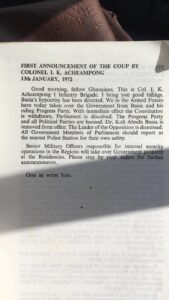Introduction
Africa is witnessing a gradual backsliding of democracy, increasingly manifesting in the growing rate of military coups unfolding across the continent. Although pockets of incidents of military coups have been recorded since 2010, there has been a marked increase in the number of attempted and successful coups since 2020. Between 2020 and 2023, 14 coup attempts were reported, while nine successful cases were recorded. Of these, West African states have recorded the highest number of coups historically and in the most recent wave; hence the characterization of the region as the “coup-belt” of the world.1
There have been numerous attempts to explain the new wave of military coups and their implications for the future of democracy in Africa. The emerging literature focuses more on external factors and the geopolitics of Africa as they relate to the “new scramble for Africa” by global powers. By focusing more on external factors – apparently due to the anti-imperialist rhetoric of the coup-makers – the domestic factors are often overlooked. In this piece, I reflect on existing institutionalist theories to establish a link between institutional failures and the return of coups in West Africa. I argue that exploring this perspective offers a compelling case for institution-building as a measure to prevent more coups in the region.
Democratic Backsliding and the New Wave of Coups in Africa
Democratic backsliding is defined as “the state-led debilitation or elimination of any of the political institutions that sustain an existing democracy.”2 It has also been defined as “the fall of liberal democracy to electoral democracy; democracy to autocracy; or institutionalized autocracy to personalist autocracy.”3 In the light of this conceptual framework, it is safe to argue that democracy is backsliding in Africa, with the collapse of democracy in many states following military takeovers.

According to Andrews Atta-Asamoah,4 Africa has experienced three waves of military coups. The first wave (1960s and 1970s) marked the first experience with military coups in Africa following failures of the post-colonial leaders to deliver on promises made during the anti-colonial and independence struggles. The coups were mostly bloody and characterized by gross human rights abuses.

The second wave of coups (1990s–2000s) was mainly directed against military leaders themselves, who failed or frustrated attempts to transition into democracy and failed to address rising socio-economic challenges.
The third wave (since 2021) is unfolding and principally targeted at civilian leaders who have failed to deliver on the dividends of democracy, after the popular democratic transitions of the 1990s. Despite having the “DNA of old coups,” as argued by Muhammad Dan Suleiman,5 the interesting side to the current wave of coup d’état is their bloodless character, as no assassination of leaders or their aides has been recorded thus far. This underscores why the response of regional organizations to the phenomenon has been chiefly diplomatic.
Institutionalist Perspective of Coup d’état
The predominant theories employed to explain past military coups include the Modernization theory,6 which was predicated on the argument that the military is a modernizing post-colonial institution with the capacity to serve as an alternative to failed civilian elites and institutions. The Military Centrality theory7 stresses the special organizational characteristics of the military institution in the post-colonial African state, as a reason for the coups. Foreign interference theory insists on geopolitical interests, contagious effects, and imperialist goals in the midst of global competition for power. Finally, the proponents of the Economic Dependency theory argue that there is a strong relationship between the dependent nature of African economies – which creates economic instabilities and social crises – and the failure of civilian leadership,8 a situation exploited by ambitious coup-makers.
While the above is useful, there is need for more explanations that capture the realities of contemporary coups, especially the realities facing African states after the third wave of democratization. In this regard, Institutionalist theories popularized by Peter Evans, Dietrich Rueschemeyer, and Theda Skocpol,9 Joel Migdal,10 Patrick Chabal and Jean-Pascal Daloz,11 and others, appear useful. The proponents argue for a return to the “State” in socio-political analysis with a critique of the society-centered approaches predominant in the 1950s and 1960s, especially the Marxist class analysis of the state. They argue instead that the state cannot be simply regarded as “an arena for competing social forces,” but rather as “a set of organizations claiming control over territories and people.”12 Therefore, state institutions have the capacity to shape and explain political phenomena. In the African context, Chabal and Daloz argue that the problem with African politics is that the state is “both vacuous and ineffectual,” rooted in colonial history and neopatrimonial politics embraced by post-colonial African leaders.13
Based on the theoretical perspective above, the central argument is that the new wave of coups in Africa is not just a military or geopolitical problem; it is a symptom of weak and dysfunctional institutions stemming from the democratic transitions of the 1990s.
Weak Institutions and Return of Coups in West Africa
From 2020, after the global COVID-19 pandemic, eight coup incidents have occurred in West Africa, making it the highest number in any region of Africa in recent times. Six were successful in Mali (2020 and 2021), Guinea (2021), Burkina Faso (2022), and the Niger Republic (2023).14
These incidents have not only changed political dynamics in the affected states but also the regional dynamics following the decision of the military regimes in Mali, the Niger Republic, and Burkina Faso to exit the Economic Community of West African States (ECOWAS) and establish the Alliance of Sahel States (AES) in September 2023.
While the external dimension to the coup phenomenon in the region cannot be disputed, there is a need to properly shed some light on the internal dynamics within the states. This is particularly so following growing public frustration over unmet expectations after the democratic transition in the 1990s.
The erosion of democracy in the aftermath of the wave of transitions in the 1990s is cause for concern. We have seen the mutation of elites in previous authoritarian systems (military and one-party systems) into Electoral Authoritarians, characterized by more autocratic leadership and weakened state institutions.
West Africa has seen the emergence of overbearing state executives who are not checked by the other arms of government. While some scholars argue that the colonial history of a coercive and exploitative state forms the foundation for the problem,15 I draw on existing studies to say that the long years of autocratic regimes, including military and one-party regimes, contributed more to the emergence of “competitive authoritarians” in contemporary African states. Increasingly, this created a disconnection between leaders and the people, with a colossal failure to address citizens’ needs. In all the states that experienced recent coups, it was apparent that citizens’ dissatisfaction with their administration was high. Given the lack of institutional checks on them, the regimes were increasingly affected by corruption, impunity, and bad governance, thereby failing woefully in national security and economic management to the extent that the people publicly demonstrated much joy following the ouster of the civilian leaders.
Furthermore, the legislature presented a significant challenge in all the states. The legislature displayed an apparent lack of independence from the executive, reduced to a mere appendage to the executive, and amenable to constitutional manipulations in favor of the president’s preferences. This has created room for the controversial removal of presidential term limits enshrined in the constitution and the approval of a third term for incumbents, which has created an electoral environment that gives incumbent leaders an undue advantage over other contestants. For example, the 2021 coup d’état in Guinea has a direct connection to the controversial alteration of the constitution, which had been altered to allow President Alpha Condé to contest and win a third term before he was later ousted by the military.
In light of the foregoing, it is helpful to note that poorly managed elections have generated citizens’ unrest in all four states due to the lack of independent electoral management bodies. The electoral bodies lack the capacity to provide a level playing field for all political parties competing for power. Therefore, election outcomes are seriously contested and a source of significant controversy. Unsurprisingly, the situation was easily exploited by the military adventurists to stage coups.
Conclusion
To prevent the wave of coups and save the future of democracy in Africa, it is crucial to pay close attention to democratic institutions, especially civil society. Civil society is the most essential institution in this regard, as it is characterized by independent organizations operating outside the government’s control. Civil society groups have the capacity to rescue governmental institutions from the grip of the governing elites and demand accountability from public and government officials through systemic checks, sensitization programs, advocacy, and civic actions. However, they can only fulfill their mandate of curbing the excesses of the governing elites if they build a strong national coalition, based on a strong commitment to democratic principles and values. Civil society will also benefit from international support, primarily through networking with pro-democracy groups operating within and outside the continent.
Endnotes
- Page, Susan D., and Kamissa Camara. “Confronting the ‘Coup Belt’ in Africa.”State & Hill, The Ford School, University of Michigan, December 12, 2023. https://fordschool.umich.edu/news/2023/confronting-coup-belt-africa.
- Bermeo, Nancy. “On Democratic Backsliding.”Journal of Democracy 27, no. 1 (2016): 5–19.
- Little, Andrew T., and Anne Meng. “What We Do and Do Not Know About Democratic Backsliding.”PS: Political Science & Politics 57, no. 2 (2024): 224–229.
- Asamoah, Andrews Attah. “Africa’s Three Waves of Coups.”Institute for Security Studies, October 20, 2023. https://issafrica.org/iss-today/africas-three-waves-of-coups.
- Suleiman, Muhammad Dan. “Towards a Better Understanding of the Underlying Conditions of Coups in Africa.”E-International Relations 24 (2021).
- Huntington, Samuel P. Political Order in Changing Societies. New Haven: Yale University Press, 1968.
- Jackman, Robert W. “The Predictability of Coups d’état: A Model with African Data.”American Political Science Review 72, no. 4 (1978): 1262–1275.
- Welch, Claude E., and Arthur K. Smith.Military Role and Rule: Perspectives on Civil-Military Relations. North Scituate, MA: Duxbury Press, 1974.
- Nelkin, Dorothy. “The Economic and Social Setting of Military Take-Overs in Africa.”Journal of Asian and African Studies 2, no. 3 (1967).
- Evans, Peter B., Dietrich Rueschemeyer, and Theda Skocpol, eds.Bringing the State Back In. Cambridge: Cambridge University Press, 1985.
- Migdal, Joel S. Strong Societies and Weak States: State-Society Relations and State Capabilities in the Third World. Princeton: Princeton University Press, 1988.
- Chabal, Patrick, and Jean-Pascal Daloz. Africa Works: Disorder as Political Instrument. Bloomington: Indiana University Press, 1999.
- Onapajo, Hakeem, and Dele Babalola. “ECOWAS and the Challenge of Preventing a Resurgence of Coups d’état in West Africa: An Assessment of the ‘Zero Tolerance’Policy.”South African Journal of International Affairs 31, no. 1 (2024): 23–44.
- Onapajo, Hakeem, and Dele Babalola. “ECOWAS and the Challenge of Preventing a Resurgence of Coups d’état in West Africa: An Assessment of the ‘Zero Tolerance’ Policy.”South African Journal of International Affairs 31, no. 1 (2024): 23–44.
- Huntington, Samuel.Political Order in Changing Societies. New Haven: Yale University Press, 1968; Jackman, Robert W. “The Predictability of Coups d’état: A Model with African Data.” American Political Science Review 72, no. 4 (1978): 1262–75.

